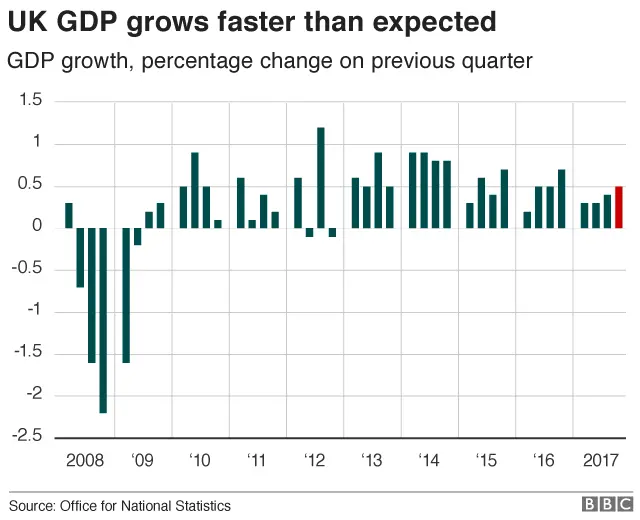UK economic growth exceeds forecasts, ONS says
 Getty Images
Getty ImagesThe UK economy expanded by a better-than-expected 0.5% in the last three months of 2017, official figures say.
Economists had expected a 0.4% expansion in the three months to December.
However, the Office for National Statistics (ONS) said the broader picture was "slower and more uneven" growth.
In 2017 as a whole, growth was 1.8% compared with 1.9% in 2016 - the slowest since 2012, the ONS said.
The services sector, which accounts for the bulk of the economy, expanded by 0.6% in the fourth quarter - stronger than the 0.4% rise in the three months to September.
"The boost to the economy at the end of the year came from a range of services including recruitment agencies, letting agents and office management," said Darren Morgan, head of GDP at the ONS.
Yet consumer-facing parts of the services sector, which include distribution, hotels, catering, transport and communications, posted much slower growth, he said.
Manufacturing also grew strongly, but construction contracted by 1% - its third consecutive fall and worst quarterly performance since the third quarter of 2012.
 Getty Images
Getty ImagesJohn Hawksworth, chief economist at PwC, said construction appeared to be the sector most affected by Brexit-related uncertainty, deterring commercial property investment and dampening the housing market, particularly in London.
Samuel Tombs at Pantheon Macroeconomics said the "undeniably strong" quarterly figures increased the chance of the Monetary Policy Committee raising interest rates again as soon as this summer.
However, Hargreaves Lansdown senior economist Ben Brettell described growth as anaemic and doubted there would be more than one rate rise this year, "probably in the autumn".
Sterling jumped 0.8% to $1.4253 following the release of the GDP figures.


Analysis: Andy Verity, economics correspondent
Choose your comparator. You might, like Bank of England governor Mark Carney, point out that the economy is about 1% smaller than the Bank predicted it would be before the Brexit vote. But that was in the event of a "stay" vote.
Pro-Brexit critics might point out the economy is doing a lot better than his own warnings about the risk of a "technical recession" if the UK voted to leave.
Annual growth of 1.8% may be less than we would like, but so far there is little sign of the Brexit-induced disaster that some predicted.